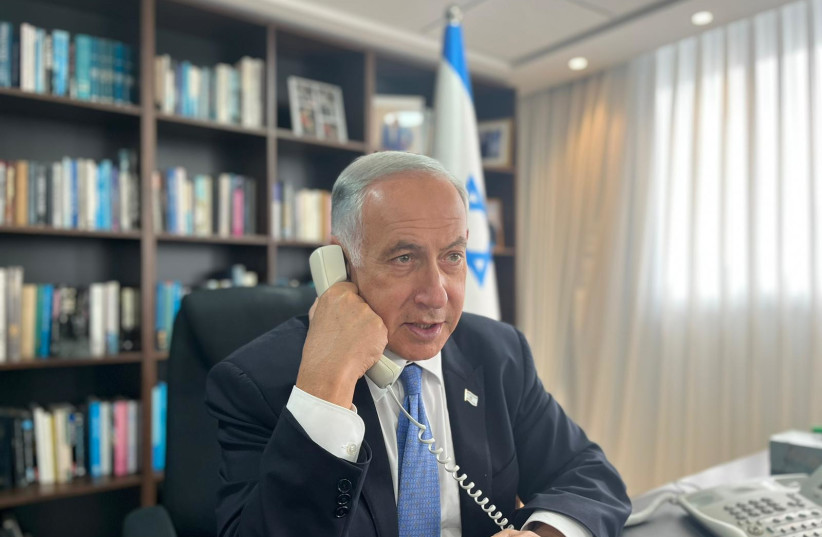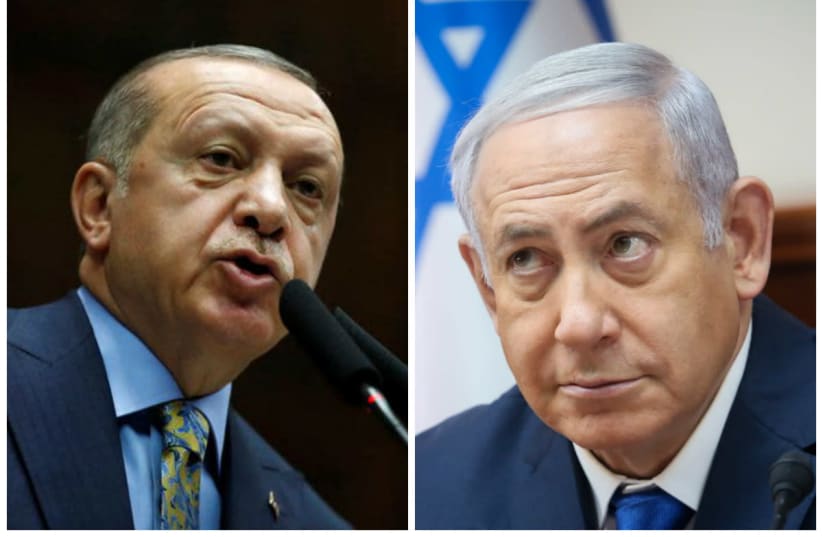Turkish President Recep Tayyip Erdogan has used his appearances at the UN General Assembly in New York as a platform for some of his infamous calumnies against Israel.
At the 2019 General Assembly, he questioned Israel’s borders and displayed a Palestinian propaganda map purportedly illustrating the shrinkage of Palestine since Israel’s creation. In a meeting with US Muslim leaders before that speech, he equated Israel’s policies in Gaza with the Nazi treatment of the Jews during the Holocaust.
Prime Minister Benjamin Netanyahu responded by branding Erdogan a liar; this exchange was just one in a series of harsh words they had for each other. A few months earlier, Netanyahu had called Erdogan a “dictator” and a “joke,” while Erdogan had referred to Netanyahu as a “tyrant.”
A year later, Erdogan continued his anti-Israel rhetoric at the UN, accusing Israel of extending its “dirty hand” over Jerusalem and praising the Palestinians for having “stood up to Israeli policies of violence and intimidation for a century.”
This speech prompted Israel’s ambassador, Gilad Erdan, to get up and demonstratively leave the hall in protest. “Erdogan continues to spout antisemitic and false statements against Israel. It is important that the world recognizes the double moral standard he has lived by for many years,” he explained later.


Netanyahu and Erdogan: A history of animosity amid the backdrop of diplomacy
But all that was in the past. On Tuesday, the UN General Assembly was the backdrop to a scheduled meeting between the two long-time leaders.
This is the second year in a row that Erdogan – who oversaw the deterioration of Israel-Turkish ties when he came to power in 2003 but recently is working to mend them – has met with an Israeli prime minister on the sidelines of the UN General Assembly. He met then-prime minister Yair Lapid there last year, after hosting President Isaac Herzog in Ankara a few months earlier for a visit that solidified the latest Turkish-Israeli rapprochement.
However, Lapid is not Netanyahu, and Erdogan did not have the same long history of animosity with Lapid as he has with Netanyahu.
For several years, Netanyahu had remained stoic in the face of Erdogan’s Israel-bashing, which often veered into antisemitism. This changed in 2017 when Netanyahu responded sharply to one of the Turkish prime minister’s harangues by saying, “I am not used to receiving lectures about morality from the leader who bombs Kurdish villagers in his native Turkey, who jails journalists, who helps Iran go around international sanctions, and who helps terrorists, including in Gaza, kill innocent people. That is not the man who is going to lecture us.”
That the two were scheduled to sit down together in New York late Tuesday underscores that interests take precedence in international relations, even when the leaders harbor an obvious dislike for one another.
There are several reasons why Israel is interested in stronger ties with Turkey, despite Erdogan’s past rhetoric and actions he took to harm Israel, such as supporting the Mavi Marmara flotilla in 2010 to break the naval blockade of the Gaza Strip and housing Hamas leaders on Turkish territory.
Israel wants these ties not only because of increased trade – Turkey remained a key trading partner even during the height of the tension between the two countries – but also because it is an important player in Syria and the wider region that, if not included inside the tent, can cause tremendous damage from outside.
Good relations with Turkey are part of a historical pattern whereby Israel seeks close ties with the non-Arab states in the region. Furthermore, improved relations with Turkey could place increasing pressure on Hamas, which has used Turkey as a base of operations over the last decade.
The meeting also serves a political purpose for Netanyahu. The prime minister’s international stature has taken a hit due to the composition of his government and the raging judicial overhaul debate. Still, meetings like these – as well as others scheduled in New York with German Chancellor Olaf Scholz, Ukrainian President Volodymyr Zelensky, and US President Joe Biden – give him legitimacy as a statesman and transmit a message to the domestic Israeli audience that he can still deliver on the world stage.
For Erdogan, improving ties with Israel is part of a drastic overhaul he is undertaking of his country’s foreign policy – a policy that left Turkey isolated in the region.
This overhaul includes a complete recalibration of ties with Israel and a similarly sharp and dramatic turn regarding relations with Saudi Arabia and the United Arab Emirates. He vehemently criticized those countries not long ago, but now seeks their friendship and financial assistance. A parallel shift, though less dramatic, is also underway in Turkey’s approach to Egypt.
Why the change? Because the goals Erdogan championed when he first came to power, which included demonstrating the compatibility of Islam and democracy, solving Turkey’s chronic economic issues, and resolving the Kurdish issue to pave Turkey’s way into the EU, have fallen short.
Now Erdogan is trying to reverse course, and his interests are threefold with Israel.
First are the economic interests. Even when Erdogan was most hostile to Israel, and the diplomatic ties between the two countries were non-existent, trade boomed.
Erdogan wants to expand that and bring energy into the mix. The country depends on Russia and Iran for its energy needs and would like to diversify through access to Israel’s natural gas reserves. Once the US in 2022 blocked the EastMed pipeline leading from Israeli gas fields through Cyprus to Greece and then to Italy and the rest of Europe, Turkey had visions of rerouting that through Turkey, which would significantly boost the Turkish economy.
Additionally, welcoming hundreds of thousands of Israeli tourists back to Turkey, while a fraction of the overall tourism flow, provides a much-needed boost to the struggling Turkish economy.
Secondly, Turkey is eager to break out of its regional isolation. Erdogan’s neo-Ottoman aspirations have been undermined by the formation of new regional alliances, such as Israel-Greece-Cyprus and Israel-UAE-Bahrain-Egypt, leaving Turkey feeling left out and threatened.
Lastly, there’s the American angle.
Erdogan had a positive relationship with former president Donald Trump, but his ties with the Biden administration have been strained. In the early 1990s, Turkey effectively used its relations with Israel to garner support from US Jewish organizations in Washington for a stronger Turkish-US relationship. Erdogan hopes that by mending ties with Israel, he can once again enlist the assistance of these organizations in Washington.
While this meeting may benefit Netanyahu domestically by reinforcing his image as a global statesman, it may not have the same positive impact on Erdogan in Turkey, where he has succeeded over two decades in power in turning Turkish public opinion against Israel.
Meeting with Netanyahu does not win Erdogan points among his Islamic base. What it does do, however, is portray him as someone willing to explore all avenues to help the Turkish economy – something that should be good for him domestically.
